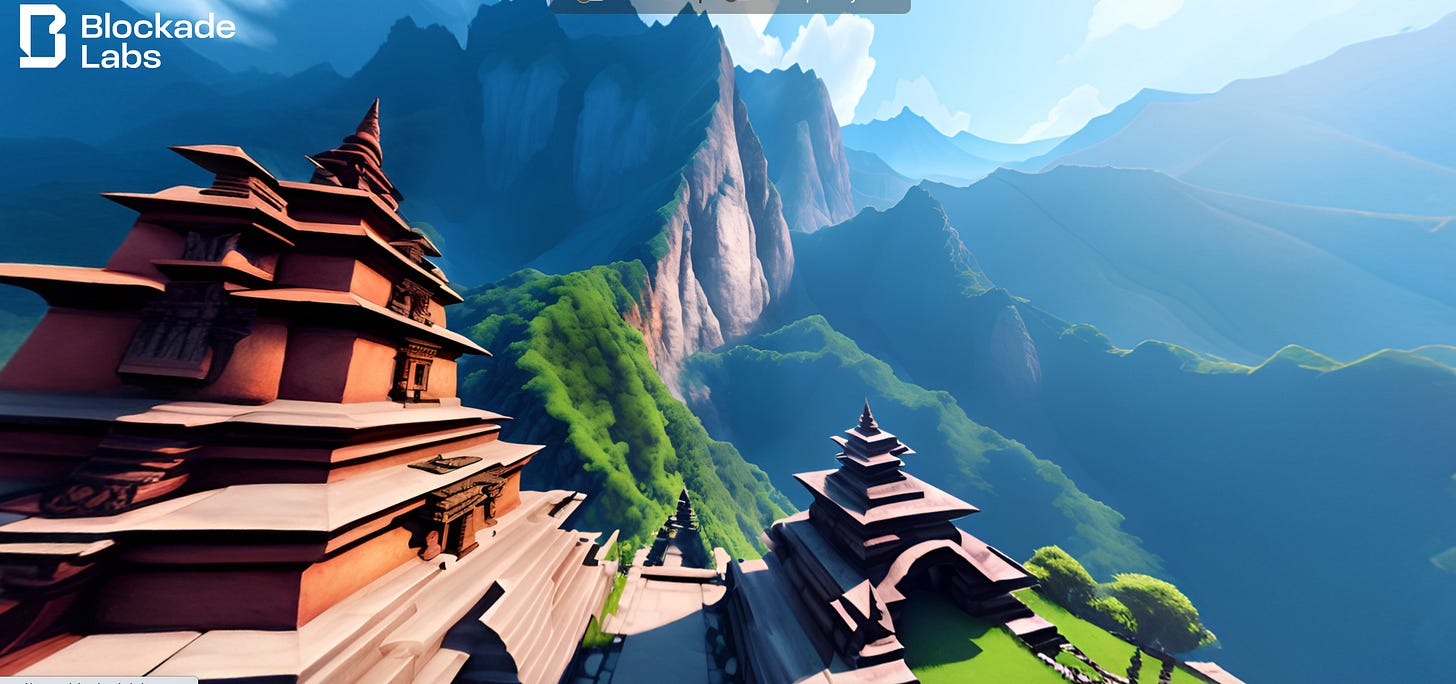I've potentially logged more hours with LEGO blocks than any single game. As a kid, I had a LEGO room (sounds fancy, it was my dad's workshop) so I could sprawl out the full monorail city without any cats sitting on it. Constant threat.
Part of the devotion to LEGO was that it was infinitely expandable and let me live out my fantasy du jour: James Bond, Indiana Jones, Star Wars, shark aquarium owner, mergers & acquisitions tycoon, shark aquarium owner that's also a spy. I was an odd kid. But whatever my passion, however I wanted to play, whatever world I wanted to create, I had the literal building blocks to do it.
Games are normally narrower—a specific play style, a certain look and feel. Some, like the Sims or Minecraft, also let you build for you, but generally you still have to "play by their rules." It makes it harder to be a shark spy, or launch a spacecraft from city to Saturn. In my dusty LEGO room, I do it my way.
With the dawn of consumer-accessible AI, however, and tools like Epic's UEFN, I believe we're about to enter an era that not only changes professional game development, but opens the Pandora's box of limitless creativity for every gamer. One that will require some significant rethinking from devs, metaverse buildings, media, and brands.
I'm already using Midjourney and Stable Diffusion to illustrate my actual dreams, mock up my future house, and make all my article banners. So what's the natural next step?
In addition to individuals being able to create their own unique universes to live out any desire, I think that AI and creator's tools will offer us the digital equivalent of the games my friends and I made up in the woods of Connecticut. Limited only to our imaginations.
And since we often talk about how gamers play where their friends are, how about if they and their friends can create whatever world they want to gather in? This presents new competition to the annual release cycles of certain popular games—why buy the new title when I can add its best components to my own game? I'm expecting a near future where hackathons pit teams against each other to build the best game most quickly:
Lore and story by OpenAI ChatGPT
Concept art by Midjourney
Game assets by Scenario
3D world by Blockade Labs
AI assisted development in UEFN, Roblox, and more to come
Some intrepid folks have already started down this path, building on the long history of modders, some of whom made it so I could keep playing the free demo of Starsiege Tribes as if it were the full game.
The trends of the past cement the fact that when given more creative control, players stick around. Roblox is going stronger than ever 17 years on, GTA Online remains a stalwart fixture after a decade. While some titles build for this maker's zone, other games keep going only because mods or players get their hands on them to build new experiences.
For the metaverse, I think the implications are huge. Metaverses won't be massive, vapid wastelands where developers top-down try to build experiences for the masses, but interconnected microverses built by ragtag groups of kids and friends upon dozens of different infrastructures. A pirate capture-the-flag island with school friends, zombie shooter survivalist commune with camp buds, a Marvel universe fan club with your Discord server. All with rules, physics, stories, economies, and visuals created by each group from scratch.
For game devs, I think this will raise the bar on quality significantly. Not everyone will opt for self-created experiences, but it's hard not to imagine a hardcore gamer clan rage quitting a match they feel is unfair and not then building their own skirmish arena with a NO HAX sign posted out front. The developers best equipped for this new world are the ones that integrate these tools natively sooner than later.
For brands and advertisers that want access to the planet's 3B players, the stakes will be raised. A more fragmented world makes it harder to know where your consumers are and when, and more challenging to ensure that the types of content there are brand-safe. But it also opens opportunities for native advertising that feels authentic: for example, REI sponsoring server costs for any game experience that involves vertical climbs or outdoor survival as long as their gear NFTs are integrated. It also intensifies the need for UGC infrastructure that can support branded content, and accelerates the benefits of brands and developers allowing their on-chain assets to be more seamlessly integrated (see the incredible Nike x EA announcement last week).
Even traditional media needs to take note. Given the option between paying to see Avatar or my friends and I filming our own underwater blue epic with a better script inside an even better-looking 3D world, I know what I'll do. Though studios that recognize the creative potential as well as the engagement benefits of interactive storytelling could unleash entirely new categories of film and TV.
We're on the very precipice of this new landscape, but given the speed with which AI is already feeling tangible to everyday consumers, and infiltrating existing toolsets, I think we're poised to see more and more control handed over to audiences to choose their own adventures, and actually create them. And I'm ready to build.




